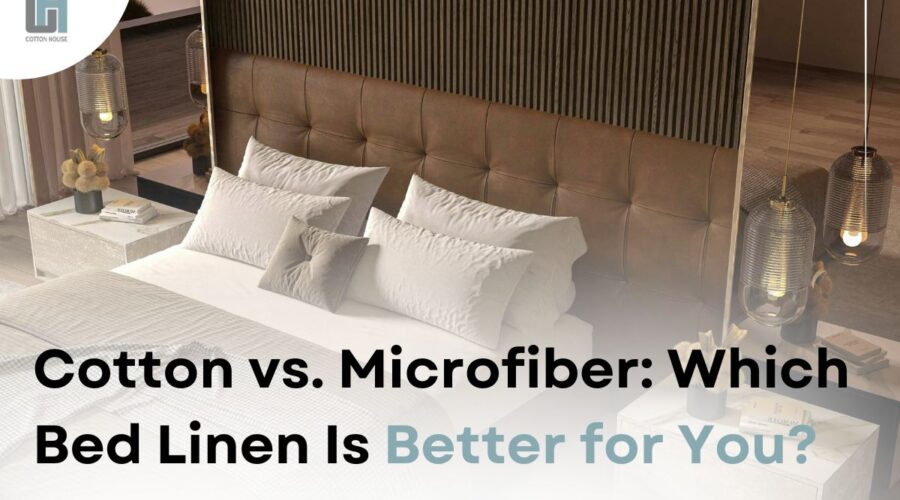
we think about better sleep, we often rush to replace our pillows or upgrade our mattress. But there’s one factor we often overlook — the quality of our bedding. Believe it or not, your sheets, pillowcases, and duvet covers have a significant impact on your health, comfort, and even mood. In this blog, we’ll break down why bedding quality matters, how it affects your sleep and skin, and what to look for when choosing the right bedding — especially if you’re shopping wholesale in Canada.
What Defines High-Quality Bedding?
Fabric Types: Natural vs. Synthetic:
High-quality bedding begins with the fabric. The most commonly used natural fibers include cotton (especially Egyptian or Pima), bamboo, and linen. These fabrics are breathable, soft, and gentle on the skin — all major contributors to better sleep and skin health. On the other hand, synthetic materials like polyester or microfiber may feel soft at first but can trap heat, irritate sensitive skin, and wear out quickly.
If you’re looking for hypoallergenic bedding materials, natural fabrics like organic cotton and bamboo are great choices as they are less likely to cause allergic reactions and are ideal for those with sensitive skin or respiratory issues.
Thread Count, GSM & Weave Styles Explained:
One of the most misunderstood aspects of bedding is thread count. While it does play a role in softness, it isn’t the only factor. A high thread count with poor-quality fabric won’t provide comfort or durability. Look for thread counts between 300–600 for cotton—a sweet spot for both softness and breathability.
For duvets and comforters, GSM (grams per square meter) is important. A GSM between 300–500 works well for most climates. Weave styles also matter: percale is crisp and cool, while sateen feels smooth and luxurious.
Certifications That Matter:
To ensure your bedding is safe, eco-friendly, and non-toxic, check for global certifications like:
- OEKO-TEX® (certified free from harmful chemicals)
- GOTS (Global Organic Textile Standard)
- Fair Trade Certified (ethical labor standards)
These are important when selecting hypoallergenic bedding materials for health-conscious households.
How Bedding Quality Impacts Your Sleep?
Temperature Regulation:
Poor bedding often traps heat, making you toss and turn. High-quality materials like cotton or bamboo are naturally breathable, allowing airflow and maintaining a cooler body temperature. This leads to uninterrupted sleep — one of the core benefits of quality bedding.
Moisture-Wicking and Breathability:
If you experience night sweats or live in a humid climate, breathable and moisture-wicking fabrics are essential. Bedding made from natural fibers can absorb moisture and release it quickly, preventing discomfort and skin irritation.
Noise, Weight, and Comfort Factors:
Ever been disturbed by the crinkling sound of cheap sheets or comforters? That’s a classic sign of poor quality bedding. Quality materials are quiet, soft, and have a balanced weight that provides comfort without causing overheating.
Effects of Poor Bedding on Skin and Health:
Acne, Allergies, and Sensitive Skin:
Low-quality bedding made from synthetic materials or treated with harsh chemicals can irritate your skin and worsen conditions like eczema or acne. It can also trigger allergies by harboring dust mites and bacteria. Choosing hypoallergenic bedding materials can significantly reduce these risks.
Bacteria and Dust Mite Accumulation:
Cheaper bedding often lacks the breathable qualities of high-end fabrics, leading to sweat retention and bacterial buildup. This not only affects your skin but can also disrupt your respiratory health. Investing in clean, certified bedding ensures better hygiene and healthier sleep.
Long-Term Benefits of Investing in Quality Bedding:
Durability and Cost-Efficiency Over Time:
While high-quality bedding may cost more upfront, it lasts significantly longer. Durable sheets resist pilling, fading, and tearing — saving you money in the long run. This is another overlooked benefit of quality bedding: cost-efficiency.
Better Sleep, Better Mood, Better You:
Multiple studies link restful sleep to improved mental health and emotional resilience. So, it’s easy to see how bedding affects sleep quality. Better bedding leads to deeper sleep, which helps you wake up more refreshed and focused.
Tips for Choosing the Right Bedding for Your Needs:
Questions to Ask Before You Buy:
- Do you sleep hot or cold?
- Do you have sensitive skin or allergies?
- What’s your budget?
- Do you prefer soft or crisp fabrics?
Answering these questions helps you filter the best fabrics and weaves based on your needs. Remember, understanding why bedding quality matters can change the way you shop forever.
Also Read: How bed sheets affects sleep?
Matching Bedding to Climate and Personal Preference:
In cooler climates, heavier GSM bedding or flannel sheets might be ideal. For hot sleepers or summer seasons, breathable cotton or bamboo bedding can be a game-changer. Matching your bedding to the environment is key to optimizing the quality of bedding for sleep.
Where to Get the Best Bedding Wholesale in Canada?
If you’re a business or retailer looking for top-tier bedding at competitive prices, Cotton House is Canada’s trusted wholesale supplier. From OEKO-TEX certified sheets to luxurious comforters and hypoallergenic bedding materials, they offer unbeatable quality and service.
Whether you’re shopping for a boutique hotel, retail store, or simply want to upgrade your bedding game in bulk, Cotton House delivers products that meet the highest standards in comfort, durability, and safety.
Final Thoughts: Quality Sleep Starts With Quality Bedding
It’s easy to overlook your bedding when optimizing for better sleep, but it plays a crucial role in how well you rest, how healthy your skin stays, and how long your sheets last. Understanding why bedding quality matters helps you make informed decisions that improve not just your sleep — but your life.
If you’re serious about upgrading your sleep experience or sourcing wholesale bedding in Canada, Cotton House is your go-to destination for premium, hypoallergenic bedding materials built for comfort, longevity, and skin health.
FAQs About Bedding Quality
Q1: Does thread count really matter for bedding quality?
Yes, but only to a certain extent. While thread count affects softness, fabric quality and weave play a more important role in determining durability and comfort.
Q2: What type of bedding is best for sensitive skin?
Natural, hypoallergenic fabrics like organic cotton or bamboo are ideal. They’re breathable, soft, and less likely to cause irritation.
Q3: How often should I replace my bedding?
Typically, high-quality sheets can last 3–5 years. Lower-quality bedding may need replacing every year due to wear, fading, or hygiene concerns.
Q4: Are expensive sheets always better?
Not necessarily. Price isn’t the only indicator of quality. Look for the right combination of fabric type, certifications, and weave instead of relying on cost alone.



